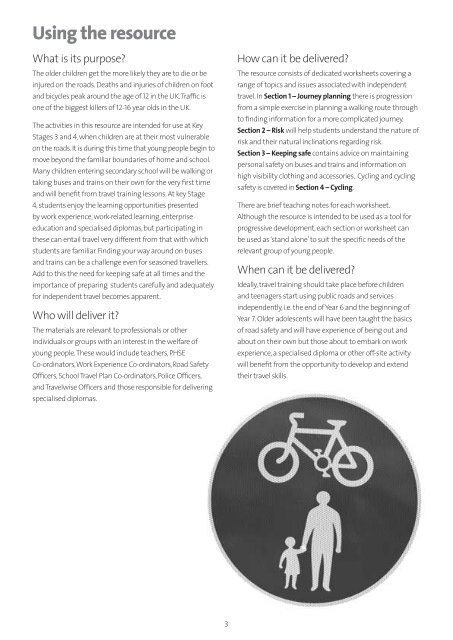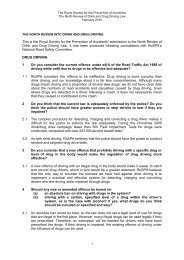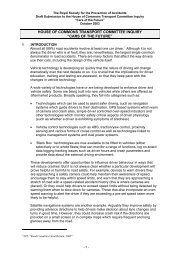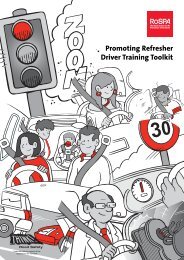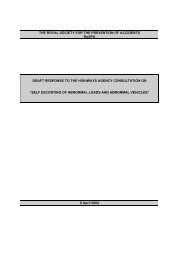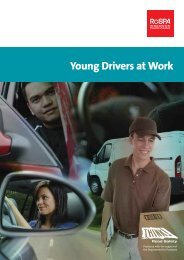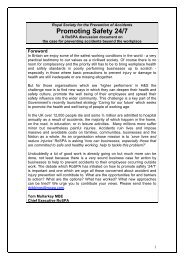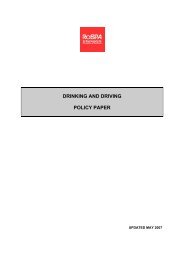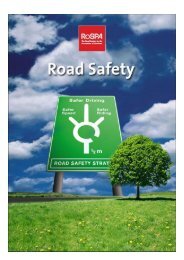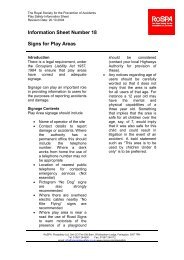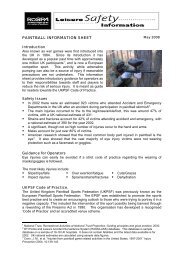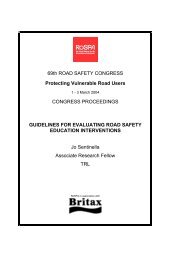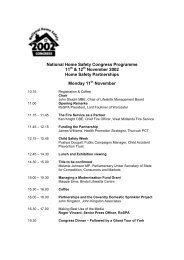Travel training - Key Stages 3 and 4 - RoSPA
Travel training - Key Stages 3 and 4 - RoSPA
Travel training - Key Stages 3 and 4 - RoSPA
Create successful ePaper yourself
Turn your PDF publications into a flip-book with our unique Google optimized e-Paper software.
Using the resource<br />
What is its purpose?<br />
The older children get the more likely they are to die or be<br />
injured on the roads. Deaths <strong>and</strong> injuries of children on foot<br />
<strong>and</strong> bicycles peak around the age of 12 in the UK. Traffic is<br />
one of the biggest killers of 12-16 year olds in the UK.<br />
The activities in this resource are intended for use at <strong>Key</strong><br />
<strong>Stages</strong> 3 <strong>and</strong> 4, when children are at their most vulnerable<br />
on the roads. It is during this time that young people begin to<br />
move beyond the familiar boundaries of home <strong>and</strong> school.<br />
Many children entering secondary school will be walking or<br />
taking buses <strong>and</strong> trains on their own for the very first time<br />
<strong>and</strong> will benefit from travel <strong>training</strong> lessons. At key Stage<br />
4, students enjoy the learning opportunities presented<br />
by work experience, work-related learning, enterprise<br />
education <strong>and</strong> specialised diplomas, but participating in<br />
these can entail travel very different from that with which<br />
students are familiar. Finding your way around on buses<br />
<strong>and</strong> trains can be a challenge even for seasoned travellers.<br />
Add to this the need for keeping safe at all times <strong>and</strong> the<br />
importance of preparing students carefully <strong>and</strong> adequately<br />
for independent travel becomes apparent.<br />
Who will deliver it?<br />
The materials are relevant to professionals or other<br />
individuals or groups with an interest in the welfare of<br />
young people. These would include teachers, PHSE<br />
Co-ordinators, Work Experience Co-ordinators, Road Safety<br />
Officers, School <strong>Travel</strong> Plan Co-ordinators, Police Officers,<br />
<strong>and</strong> <strong>Travel</strong>wise Officers <strong>and</strong> those responsible for delivering<br />
specialised diplomas.<br />
How can it be delivered?<br />
The resource consists of dedicated worksheets covering a<br />
range of topics <strong>and</strong> issues associated with independent<br />
travel. In Section 1 – Journey planning there is progression<br />
from a simple exercise in planning a walking route through<br />
to finding information for a more complicated journey.<br />
Section 2 – Risk will help students underst<strong>and</strong> the nature of<br />
risk <strong>and</strong> their natural inclinations regarding risk.<br />
Section 3 – Keeping safe contains advice on maintaining<br />
personal safety on buses <strong>and</strong> trains <strong>and</strong> information on<br />
high visibility clothing <strong>and</strong> accessories. Cycling <strong>and</strong> cycling<br />
safety is covered in Section 4 – Cycling.<br />
There are brief teaching notes for each worksheet.<br />
Although the resource is intended to be used as a tool for<br />
progressive development, each section or worksheet can<br />
be used as ‘st<strong>and</strong> alone’ to suit the specific needs of the<br />
relevant group of young people.<br />
When can it be delivered?<br />
Ideally, travel <strong>training</strong> should take place before children<br />
<strong>and</strong> teenagers start using public roads <strong>and</strong> services<br />
independently, i.e. the end of Year 6 <strong>and</strong> the beginning of<br />
Year 7. Older adolescents will have been taught the basics<br />
of road safety <strong>and</strong> will have experience of being out <strong>and</strong><br />
about on their own but those about to embark on work<br />
experience, a specialised diploma or other off-site activity<br />
will benefit from the opportunity to develop <strong>and</strong> extend<br />
their travel skills.


